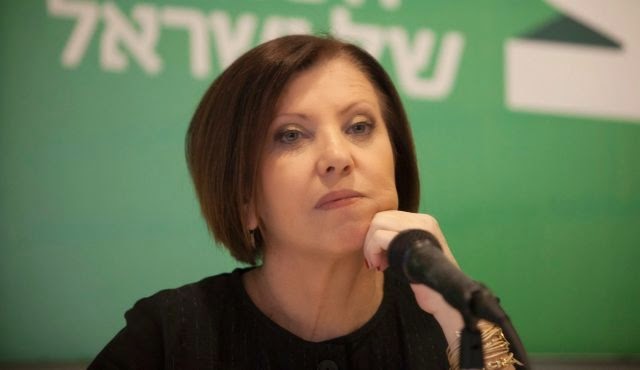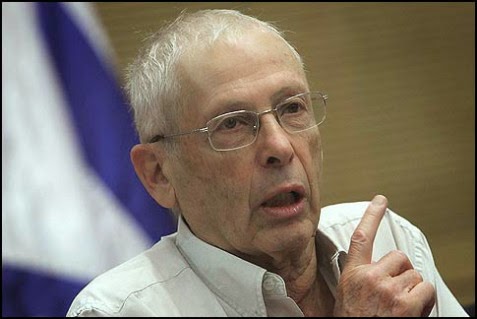Israel’s Fear of the Boycott Demonstrates Its Power
There is one weapon that Israel fears more than any other – the Boycott. Terrorism, suicide bombing, demagogy - holds no terror for the Israeli state compared with the Boycott. Why? It can be summed up in a single word - ‘Delegitimisation’.
One of the many talking heads and policy wonks who are employed on Israel’s behalf, Brigadier General (Ret.) Michael Herzog, a senior fellow of the Jewish People Policy Institute
explained:
‘What is delegitimization and what separates it from legitimate criticism? At its heart, it is the rejection of Israel's legitimacy as the nation-state of the Jewish people. … This campaign usually begins with legitimate criticism, which is then expanded to include the portrayal of Israel as an inherently immoral entity due to its birth, essence, and character.
‘Israel is indeed strong, but it is small and to a great extent dependent upon its international legitimacy. A significant increase of its delgitimization may isolate it, erode its deterrence and its freedom to act in its own defense, harm its economy, and expose it to legal assault. The delegitimators hold before their eyes the image of South Africa, which despite its military and economic might finally caved under the accumulating pressure of years of sanctions and delegitimization. As early as the 2001 Durban Conference, 1500 non-governmental organizations termed Israel an "apartheid state" and called for its "complete isolation."…Don't Underestimate the Delegitimization of Israel.’
Israel and Zionism’s defenders generously inform us that we can oppose one or other of Israel’s policies, but if we connect the dots and discern a pattern and as a consequence of that conclude that there is something special and different about the Israeli state and the way it defines itself as a Jewish state rather than a state of its own citizens, then what we are doing is ‘anti-Semitic’. ![]() |
| Skinheads in Sweden Confronted by anti-Fascists |
Of course the reality is that this is no more anti-Semitic than opposition to Apartheid in South Africa was an example of being ‘anti-White’ which some of the more stupid defenders of Afrikaanerdom attempted. What Israel’s protagonists are doing is to create a racial state based on religion as the signifier, the marker that defines the borders and boundaries. Those borders are, of course its indigenous population and a challenge to that is a challenge to Israel’s ‘legitimacy’. Israel’s legitimacy includes the right to dispossess the Palestinians in the name of its own identity, to expel them and to deny them any political or civil rights.
There are, though, secondary victims of this legitimacy. Firstly conversions to Judaism performed by Conservative or Reform rabbis, or indeed Conservative or Reform Jews who are the children of such converts, are not recognised by the Orthodox Rabbinate as Jews, though the Israeli state recognises conversions performed outside Israel for the purpose of the Law of Return, they cannot marry, divorce or be buried in a cemetery for Jews controlled by the Orthodox Rabbinate . Jews in Israel who are not Jews according to the halachic (the oral Jewish law as laid down in the Talmud) definition, i.e. children of a Jewish mother, are in a mixed category of mixed race Jews. This is effectively the equivalent of the Nazi ‘mixed race’ (Mischlinge).
The question of ‘Who is a Jew’ has become the eternal insoluble question for Israel’s politicians and judiciary. It is as impossible to answer as the question of who was an Aryan in Nazi Germany or a White in South Africa (where there was a category of ‘honorary Whites’ for those such as the Japanese). It is impossible to define a ‘pure’ race when there is no scientific basis to race in the first place, which is why in Germany, the definition of Aryan was in the negative, i.e. not a Jew or a lesser racial category, and the definition of who was a Jew rested on whether one’s grandparents practiced Judaism in 1870.
To those who doubt that Israel has attempted to create a new, racial category of Jew one only needs to look at the identity card that every Israeli posseses. It has a category for citizen and separate ones for nationality and religion. Many Jews put down ‘none’ for religion but ‘Jew’ as nationality. Zionism’s aim was always to transform a religious people into a nation/race. [Akiva Orr, The UnJewish State, Ithaca Press, 1983, p.100]
The definition of Israel as a Jewish State is crucial to all of this. It marks out those who will receive privileges such as access to leasing most ‘national’ land (93% of the total Israeli land) and various other benefits. The current March 2015 General Election is being called around this question. The Israeli Labour Party and much of the Zionist mainstream oppose making this explicit but there is wall to wall consensus in the Zionist movement behind the notion that Israel is a Jewish state.
The racial category of ‘Jew’ is not based on a biological definition but on the mythical construction of the ‘Jewish people.’ Hence when it comes to white Europeans or even Indian Jews then the Israeli Jewish race can incorporate them, as tiers within the ‘Jewish people’. For example the Bnei Menaishe are a group of around 5,000 Indians who claim to be ‘lost Jews’. Because they profess their devotion to the Israeli state, despite the fact that their belief is a total myth, two thousand have been brought to Israel. The Rabbis, normally so vigilant when it comes to converting non-Jews, have issued the necessary rulings and Israel’s Jewish population is in consequence enhanced. 'Lost’Indian Jews come to Israel despite skepticism over ties to faith Ha’aretz 20.10.13
Boycott challenges the core legitimacy and ultimately the identity of Israel and that is why it is feared. Not so much for its economic impact, which at the present time is limited, but because of its political impact.
This is why a key part of the Zionist fightback is to label the Boycott of Israel as ‘anti-Semitic’. The comparison made is with the Nazi so-called boycott of Jewish shops in Germany on 1st April 1933. In fact the SA stormtroopers weren’t campaigning for a boycott of Jewish shops, they were enforcing an armed siege of Jewish shops. There was no element of persuasion as opposed to physical coercion in what they did.
The Zionists, who always use the example of the Nazi ‘boycott’ of Jewish shops never every make any mention of the International Jewish Boycott of Nazi Germany because that would destroy their case. It would also bring to the fore the record of the Zionist movement itself during the Nazi era when they concluded a trade agreement, Ha’avara with Nazi Germany, which broke the International Boycott that could have removed Hitler from power. [see Edwin Black, Ha’avara – The Transfer Agreement, Brookline Books, 1999] No less than 60% of the capital investment in the Jewish Palestinian economy between 1933 and 1939 came from Nazi Germany [David Rosenthall,
Chaim Arlosoroff65 Years After his Assassination, Jewish Frontier, May-June 1998, p. 28, New York.
http://www.ameinu.net/publicationfiles/Vol.LXV,No.3.pdf]
Below is a potted history of the Boycott movement, which demonstrates that it was a vital non-violent movement in support of the oppressed – from Ireland and the West Indies to South Africa and now Israel.
Tony GreensteinThe Boycott of Slave Grown Sugar
“By encouraging as much as possible the introduction of the products of free labour, and refusing to use any articles which have been cultivated by slaves, the women of Great Britain may do more for the suppression of the inhuman slave trade, than all the ships of war that have ever ranged the coasts of Africa…does not the price of every pound of slave-grown sugar, and of every yard of slave-grown cotton, purchased for a British home, become a positive premium on cruelty – a direct encouragement to those, who buy and sell human beings - who tear the wife from the husband, and the child from the parent – who steal the infant out of the cradle, and flog the mother with a cart-whip?”(‘To the Women of Great Britain – on the Disuse of Slave Produce Pamphlet’, Birmingham and West Bromwich Anti-Slavery Society, 1849, accessed via JSTOR)
![]() |
| Tyler Family Papers - Poem on Slavery |
After Parliament rejected the abolition bill in 1791, abolitionists took action by sidestepping Parliament entirely and calling for a boycott on Britain's largest import,
slave-grown sugar. The Transatlantic Slave Trade flourished because a market existed for produce created using enslaved labour:- rum, cotton,
tobacco, coffee and particularly sugar. The abolitionists understood that profits from the sugar they used in tea or cakes kept the Slave Trade running.
If economic pressure could be put on slave-dependent industries, then this might hasten the end of the trade. An anti-sugar pamphlet by William Fox was published in 1791; it ran to 25 editions and sold 70,000 copies in four months. Spurred on by pamphlets and posters, by 1792, about 400,000 people in Britain were boycotting slave-grown sugar. Some people managed without, others used sugar from the
East Indies, where it was produced by free labour.
![]() |
| Silohouettes of Elizabeth Heyrick |
Grocers reported sugar sales dropping by over a third, in several parts of the country, over just a few months. During a two-year period, the sale of sugar from India increased ten-fold
(see Adam Hochschild: Bury the chains). James Wright, a Quaker and merchant of Haverhill, Suffolk, advertised in the General Evening Post on March 6th, 1792, to his customers that he would no longer be selling sugar. He declared:
".....Being Impressed with a sense of the unparalleled suffering of our fellow creatures, the African slaves in the West India Islands.....with an apprehension, that while I am dealer in that article, which appears to be principal support of the slave trade, I am encouraging slavery, I take this method of informing my customer that I mean to discontinue selling the article of sugar when I have disposed of the stock I have on hand, till I can procure it through channels less contaminated, more unconnected with slavery, less polluted with human blood......"
(A full copy of this article can be read
here)
![]() |
| Slave-grown sugar in the West Indies |
The boycott was revived in the 1820s, as the English movement pushed for the total abolition of slavery in the British colonies. Abolitionists also campaigned for people to stop purchasing at shops that sold sugar produced using enslaved labour and some traders used
notices- similar to the fair trade notices of today - to let customers know that their sugar did not involve slave-labour.
These campaigns were primarily supported by the female anti-slavery associations, who distributed thousands of pamphlets and leaflets door-to-door, in an effort to persuade British consumers not to buy West Indian sugar. English ceramic manufacturers responded by making
sugar bowls and tea sets inscribed with anti-slavery slogans.
Although the effect may not have been crippling to the industry, it brought together abolitionists in common cause and, at a time when only a small fraction of the population could vote,
citizens (particularly women) foundthe power to act when Parliament did not.
“The great mass of abolitionists,” declared Quaker abolitionist Sarah Pugh in 1841, “need an abstinence baptism.” Speaking at the third annual meeting of the American Free Produce Association, Pugh claimed many abolitionists were stained by the “taint of slavery” through their continued consumption of goods produced by slave labor.
In the eighteenth and nineteenth centuries, abolitionists urged consumers to boycott slave-labor products such as sugar, indigo, rice, and cotton. For Pugh and other like-minded abolitionists, the boycott was about moral consistency: to be an abolitionist meant refusing to benefit from slave labor. Still other abolitionists focused on the enormous wealth vested in slaves and in slave-labor goods, arguing that a boycott of slave-labor goods would strike at the economic root of African slavery.
Boycotting of these goods began in the 1750s as part of the Quaker reformation. The Seven Years’ War had led many colonial Quakers to view the political crisis as a moral crisis caused by Friends’ continued support of slavery. Citing the golden rule, Quakers like John Woolman now claimed slavery violated Christian principles of universal brotherhood.
Woolman urged Quakers to reject slave-labor goods, describing slaves and the proceeds of their labor as “prize goods” that had been seized by force as an act of war. Slaves were captured and held for the purpose of stealing their labor, all for the profit of their masters. Both purchasing and using slave-labor goods, Woolman and other Quakers argued, were contrary to Quaker precepts.
This boycott remained a predominantly Quaker movement until the 1780s when abolitionists connected Britons’ dependence on slave-grown sugar to debates about the international slave trade.
slave grown sugar 2.png
![]() |
| Gillray influential print of sugar growers, Nat'l. Portrait Gallery, London |
“Blood-Stained Sugar”
After Parliament failed to pass a slave trade abolition bill in the spring of 1791, abolitionists urged British consumers to join a national boycott of slave-grown sugar. In support of the boycott, Baptist printer William Fox wrote An Address to the People of Great Britain on the Utility of Refraining from the Use of West India Sugar and Rum. Fox calculated that if just one family consuming five pounds of sugar per week abstained from sugar, that family could save the life of one slave.
Fox worked with his business partner Martha Gurney to produce nearly 130,000 copies of his pamphlet, which went through 26 editions. Another 120,000 copies were printed by other publishers in the United States and Great Britain between 1791 and 1792, surpassing Thomas Paine’s Rights of Man as the most widely distributed pamphlet of the eighteenth century. In addition to Fox’s tract, dozens of other anti-slavery and anti-sugar pamphlets were produced.
Ladies’ tea tables were specifically targeted as these were among the most popular sites for consumption of slave-grown sugar. The tea table was already viewed askance by many critics who saw it as a site “for tea and scandal.” The table also represented privilege, leisure, unchecked consumption, and gossip.
Women were now encouraged to step away from their tea tables and reject sugar stained with “the blood of their fellow creatures.” One writer claimed the physical conditions of colonial slavery produced sugar contaminated not only by slaves’ blood but also sweat, lice, and jiggers. In his print, “Barbarities in the West Indias,” caricaturist James Gillray invoked the horror of cannibalism, suggesting that slaves were boiled in pots of sugar cane juice. These graphic images were intended to create a sense of disgust and revulsion in those who consumed sugar. These appeals also played on what was seen as women’s innate sense of compassion.
More than 400,000 consumers rejected West Indian sugar at the height of the boycott. By mid-1792, however, the boycott stalled as the French Revolution turned violent. Horrified conservatives in Britain distanced themselves from grassroots protests such as signing petitions and boycotting sugar. Support for the boycott vanished.
It took another ten years for Britons and Americans to abolish the international slave trade. Great Britain abolished the slave trade in 1807; the United States abolished the trade in 1808.
Quakers made attempts to continue abstention from slave-labor products after 1808. New York Quaker Elias Hicks wrote Observations on the Slavery of Africans and Their Descendants, and on the Use of the Produce of Their Labour in 1811. Like Woolman sixty years earlier, Hicks described slave-labor goods as “prize goods.” The produce of the slave’s labor, according to Hicks, was “the highest grade of prize goods, next to his person.”
Still the boycott of slave-labor did not regain the momentum of the 1790s until 1824 when British Quaker Elizabeth Heyrick suggested a more radical solution: the immediate, uncompensated abolition of slavery. Removing the market for slave-labor goods, she argued, was the first step in the immediate abolition of slavery.
Women supported both the boycott and immediatism. In doing so, they challenged leading male abolitionists who continued to support gradual, compensated (for slaveholders) abolition of slavery. But when female abolitionists threatened to withhold financial support from the national antislavery society, male abolitionists relented. In 1833, Parliament passed the Emancipation Act, which was amended five years later, ending the interim apprenticeship plan and granting slaves full freedom.
In the United States men and women who had been influenced by Heyrick, including Quaker abolitionists James and Lucretia Mott, organized free-produce societies. In 1833 the American Anti-Slavery Society and the Philadelphia Female Anti-Slavery Society (PFASS) included free-produce resolutions in their founding documents.
Pennsylvania Hall was burned only four days after its completion. Yet pledges to give preference to free-labor products often failed to address the very real challenges of supply and variety which confronted shop owners and consumers. Lydia White, for example, was a member of the PFASS; her free-labor store in Philadelphia struggled to maintain an attractive, steady supply of goods for customers.
In an attempt to solve the supply problem, American abolitionists organized the Requited Labor Convention in 1838. The convention coincided with other abolitionist meetings, including the second annual Anti-Slavery Convention of Women, in Philadelphia at the newly constructed Pennsylvania Hall. Those meetings ended abruptly when anti-abolitionist mobs burned the hall.
In October 1838 convention delegates met again and established the American Free Produce Association (AFPA), the first national organization dedicated to the promotion and production of free-labor goods. Along with the British India Society (BIS), established in 1839, British and American abolitionists looked forward to increased production of free-labor cotton, sugar, and other goods.
Unfortunately, the AFPA and the BIS failed to gain support. Prominent abolitionists like William Lloyd Garrison criticized the free-produce movement. Initially a supporter of the slave-labor boycott, Garrison had come to believe the boycott was impossible to enforce and a distraction from other, more practical tactics. In Britain, the BIS lost political support and was absorbed into the Anti-Corn Law League. At the World Anti-Slavery Convention in 1840, divisions among American and British abolitionists who were quarreling over strategies and leadership eclipsed the boycott.
Still the boycott of goods produced by slave labor continued through the American Civil War, retaining support from women, Quakers, and black abolitionists. Boycotting slave labor was a radical statement of abolitionist consistency and racial identification and the women of the PFASS emphasized the morality of free produce.
Likewise, Quakers emphasized the morality of free-labor goods while also focusing on the economics of the slave-labor boycott. In an attempt to increase the supply and quality of free-labor goods, George W. Taylor and other Quakers established the Free Produce Association of Friends of Philadelphia Yearly Meeting in 1845. Taylor also operated a free-produce store.
African American abolitionists focused on the economics of slave and free labor. In 1850, for example, Henry Highland Garnet, an African American abolitionist toured Great Britain, promoting free produce. He also worked with American Quaker Benjamin Coates on a plan to establish a free-labor colony in Africa.
Abolitionists who supported the boycott of slave labor asserted the importance of consistency in abolitionist work and the value of a moral economy. That they continued to make these arguments in spite of bitter criticism from even their fellow abolitionists is evidence of their incredible resilience and their commitment to the slaves' cause.
IRELAND: How did the term "to boycott" originate?
![]() |
| Captain Boycott |
Northern Ireland of the 1880’s was mostly owned by relatively rich landowners, many of whom were of English descent and Protestants, while the land was worked by tenant farmers, mainly Irish and Catholic. As predictably happens whenever one group controls the assets and there are numerous asset-less workers, the tenants were often exploited. In the 1870’s, there had been a depression, so farm prices dropped, as well as a famine. Many farmers were unable to pay their rent.![]() |
| Captain Boycott in Punch |
Lord Erne, 3rd of his name, owned estates in County Mayo in Northwest Ireland. His landlord’s agent was Captain Charles Boycott. An Englishman, Boycott had a tenant farm himself. As agent, his main job was collecting rent from Lord Erne’s tenant farmers.
![]() |
| Charles Stuart Parnell |
The tenant farmers had complaints. They felt their rent was too high; that they had no rights to improvements they made to the land they worked. They felt the situation unfair, demanding at the least a reduction in rent following years of low prices for their produce and a lengthy famine. The Irish Land League was formed in 1879, campaigning for the three F’s: Fair rent, Fixity of tenure, and Free sale. For the next few years, the Land War ensued throughout Ireland.
![]() |
de burgo castle at Lough Mask House - Boycott abseilling
|
The main choice of protest entailed refusing to pay rent unless the landlord agreed to a rent reduction. This tactic succeeded in getting a 25% rent reduction from a Catholic Bishop in one of the first protests. But Lord Erne was made of sterner stuff. He refused his tenants' demands for lower rent and had Boycott evict the non-paying tenants.
![]() |
| Orangemen Break Boycott |
Previous similar incidents often turned violent; Irish revolts had been repeatedly crushed by England’s superior force; agrarian violence in the Land War resulted in many deaths, harsher criminal penalties, and eventually disbandment by force of the Irish Land League. However, this time, the Irish adopted a new tactic.
On September 19th, 1880, Charles Stuart Parnell, the Irish Land League President. gave a speech. During it, Parnell asked: "What do you do with a tenant who bids for a farm from which his neighbor has been evicted?" The crowd had some answers. "Kill him,""Shoot him,""Refuse him whiskey!" Parnell replied:
“I wish to point out to you a very much better way – a more Christian and charitable way, which will give the lost man an opportunity of repenting.
“When a man takes a farm from which another has been evicted, Shun him in the streets of the town, you must shun him in the shop, you must shun him in the fairgreen and in the marketplace, and even in the place of worship, by leaving him alone, by putting him in a moral Coventry, by isolating him from the rest of his country as if he were the leper of old, you must show your detestation of the crime he has committed”.
Irish revolts which used force had repeatedly failed. The new tactic—shunning, refusing to do business with them at all—was first tried against Lord Erne and Captain Boycott.
The locals refused to harvest Lord Erne’s crops and isolated Boycott. People refused to speak to him; no one would do business with him; washerwoman refused his laundry; the mail carrier refused to deliver his mail. Boycott claimed the mail carrier—a mere boy!—had been threatened with violence if mail service continued. Even shop owners in a nearby village refused to serve him.
The matter garnered great attention when the London Times published Captain Boycott’s letter complaining about his situation. The English newspapers sent correspondents to Ireland. The English papers viewed the situation as Irish Nationalists victimizing a dutiful servant of a Peer of the Realm.
To be sure, Boycott's version of events, as supported by later witnesses, question whether the tenants' actions were violence free as Parnell's speech urged. The sheriffs trying to evict Lord Erne's tenants, for example, swore they were pelted by stones and dung. Thrown by women no less.
To harvest Lord Erne’s crops, fifty protestant Orangeman traveled to Lord Erne's estate; to protect them, the crown deployed an entire troop regiment and more than 1,000 Royal Irish Constabulary. Approximately £10,000 was spent to harvest £500 worth of crops.
The shunning of Captain Boycott proved successful (depending on your point of view one must say) in at least a few respects:
Boycott left Ireland in December 1880.
British newspapers began using the “boycott” not as a proper name but to describe a tactic of protest. The verb "boycott" entered the English, Dutch, and other lexicons.
And, in 1888, a young man named Mohandas Karamchand Gandh arrived in London to study law.
U.S. actor calls for the boycott of Nazi Germany, 1938. Famous personalities from the entertainment world have met in Hollywood in order to sign a petition to President Roosevelt, which asks for the economic boycott of Nazi Germany. From left to right: Melvyn Douglas, James Cagney, Edward G. Robinson (seated), Gale Sondergaard, Mrs. Melvyn Douglas, Henry Fonda and Gloria Stuart (standing).
The Boycott of Nazi Germany
![]() |
| mass rally in the United States against Hitler |
As soon as Hitler became Chancellor of Germany on January 30
th1939, world Jewry and the international labour and trade union movement began organising a Boycott of Nazi Germany. The Germany economy was already in dire straits.
![]() |
| The Daily Express's anti-Semitic headline |
The Boycott so worried the Nazi leadership that on March 25th 1933 Goering summoned the leaders of the three major German Jewish organisations Julius Brodnitz (CV), Max Naumann (Union of National German Jews) and Heinrich Stahl (President, Berlin Jewish Community) to a meeting. They were ordered to go to London and New York in order to put an end to the stories about the persecution of Germany’s Jews and to have the Boycott of German goods called off. [Black, p. 37, The Transfer Agreement, Brooklyn Books, Massachusetts, 1999.] The Zionist Federation of Germany (ZVfD) had not been invited to the meeting because ‘Zionism in Germany was a mere Jewish fringe movement.’ [Edwin Black, Ha’avara – The Transfer Agreement, Brookline Books, London, 1999, p. 35.] The ZVfD nonetheless found out about the meeting and managed to secure an invitation for their President, Kurt Blumenfeld. ![]() |
| The mammoth demonstration of 100,000 at Madison Square Gardens |
Goering’s immediate concern was to have a mammoth boycott rally in New York’s Madison Square Gardens on March 27th called off. 55,000 would attend.[ Black, p.42] The leaders of Germany’ Jewish community maintained that they were helpless to prevent a boycott of Nazi Germany and that they had no influence over Jewish actions in Great Britain or America. However![]() |
| SA Siege of Jewish Shops |
Blumenfeld stepped forward on behalf of the Zionists, declaring that the German Zionist Federation was uniquely capable of conferring with Jewish leaders in other countries… Once uttered, the words forever changed the relationship between the Nazis and the Zionists. ‘ [Edwin Black, p.36.]
Goering told the German Cabinet that at the 25th March meeting, the Jewish and Zionist groups had feuded but that the Zionists had agreed to use their influence to stop the newspaper accounts of the atrocities and attacks on German Jews.[Black, p. 52, citing minutes of the meeting of the German Cabinet of 29.3.33.]
On April 1st the International League Against Anti-Semitism declared a permanent Boycott. On April 2ndthere was a mass protest by Jewish and Christian clergy. On April 3rd 70,000 Greek Jews gathered in a mass protest and in Panama fifteen leading Jewish firms cancelled all orders with Germany. On April 4ththere were Jewish protests in Bombay. In Upper Silesia, which Hitler later annexed and where Auschwitz was situated, anti-German boycott violence was so extensive that the German Foreign Ministry threatened to complain to the League of Nations. In Britain the police in London and Manchester threatened to prosecute storeowners displaying Boycott posters. [Black, pp.104-5.] The Daily Heraldestimated that the fur boycott alone would cost Germany $100 million annually. In the US, the American Jewish Committee and Bnai Brith opposed a Boycott. On March 19th their European equivalents held a conference in Paris which decided that a Boycott was ‘not only premature but likely to be useless and even harmful.’ [Black, p.12.] The Jewish bourgeoisie feared a Boycott more than the Hitler regime.
On May 6th, IG Farben, a large German chemical company, admitted there had been ‘an extraordinary slump due to anti-Nazi trade reprisals.’ which the Munich Chamber of Commerce confirmed on May 7. On May 8ththe German Economics Minister, Hjalmar Schacht threatened to stop paying interest on American loans and then to default entirely on its foreign debt. [Edwin Black, p. 116].
‘On several occasions between April and July Foreign Minister von Neurath expressed concern over the boycott movement….Clearly the boycott had generated considerable fear in Berlin about its potential for severely disrupting the government’s economic policies.’ [Nicosia, Zionism and anti-Semitism in Nazi Germany, pp. 83-4. Cambridge University Press, 2008].
By mid-April England had supplanted Germany as the largest exporter to Denmark and Norway. Sales to Finland were drastically down. Total German exports were 10% down in April. For June the export surplus was down by 68% compared to May. For the entire first half of 1933 exports were down 51% and to other European countries by at least 23%. Exports to France decreased by 25%. ‘That six month loss would have been greater except that the anti-Nazi boycott had not really commenced until late March.’ [Black, p.223.] In Egypt the boycott was especially marked with a drop of $0.5 million weekly. “Egypt was enforcing a virtually hermetic blockade.”They were also down 22% to America compared with 1932 levels. [Black, pp.265, 273.] This was despite the Zionist and Jewish leadership’s opposition.[ Black, p. 273 citing NYT 1.8.33.]
Goering, who stipulated that those who disseminated atrocity propaganda faced the death penalty and began drawing the obvious conclusion that the only way to stop the atrocity propaganda was to stop the atrocities. [Black pp.223-4 citing US Ambassador in Germany (Dodd) to Acting Secretary of State 28.7.33.]
Shipping and transatlantic passenger travel were major foreign currency earners ‘but anti-Nazi boycotting virtually bankrupted the industry.’ [Black, p.264.] Foreign endowments to German universities declined by 95%. The wine industry, in which Jews had been prominent, was also facing catastrophe. The directors of the Dresden Bank resorted to asking for help from foreign banks. The Societe Generale replied pointing out that Jews had been driven from their professions and that they preferred to trade elsewhere. [Black pp. 264-6.] German banks were finding it difficult to obtain even small loans from foreign banks ‘ authoritative opinion is that Hitlerism will come to a sanguinary end before the New Year’ . [Black p.267 citing Jewish Chronicle 11.8.33]
On May 10th a massive demonstration was held, beginning in Madison Square Gardens. [Holocaust Encyclopedia, http://www.ushmm.org/wlc/en/media_ph.php?MediaId=3549]
Stephen Wise was the main speaker. Over 100,000 Jews and trade unionists took part. In Britain, on July 20, despite the opposition of the Jewish Establishment, the largest demonstration ever in support of a Boycott in Britain took place, an estimated 50,000 people. The Board of Deputies vehemently opposed a Boycott of Nazi Germany and leading Zionist figures such as Herbert Samuel, former High Commissioner in Palestine, heeded the pleas of the German Zionists to oppose the Boycott. In Britain, as in the USA, ‘the biggest obstacle to a united protest and boycott movement was the coterie of leaders standing at the helm of the Jewish community. [Black pp.62, 192]. Both the TUC and the Labour Party supported the march. The TUC instructed its affiliates and Co-operative societies to support the Boycott. [Black, pp. 15,33, 180.]although ‘it became difficult to mobilise when protest and boycott were incongruously disowned by Jewish leaders themselves.’ [Black, p. 208 citing Jewish Chronicle 28.7.33. ‘Our Leaders: A Mockery of Democracy.’] On 23rd July Neville Laski announced at the Board meeting that he would, for the first time ever, be attending the next Zionist Congress. The Jewish establishment had committed itself to a Zionist solution of the German Jewish crisis. The Board voted 110-27 against the boycott campaign. ‘This wasa reprieve for the Third Reich, a letup in the anti-German offensive…. (it) could not have come at a more decisive moment.’[Black pp. 209, 210-213 citing Jewish Chronicle 28.7.33.]
In Britain ‘raucous mass demonstrations started in Manchester and swept through Newcastle, Leeds, Birmingham and Glasgow. The protests culminated in an overflow rally May 16 at London’s Queen Hall.’ When one Jewish shopkeeper was found with German stock, a thousand angry protestors surrounded the store and mounted police had to be called in. [Black, pp. 180, 184 citing Jewish Chronicle 26 May, 5th, 19th, 9thJune 1933, NYT 23, 28 July 1933.] Even the Archbishop of Liverpool urged Catholics to join the Boycott!
On May 12th the prestigious Leipzig fur auction was held. The auction was a complete failure as $3m of furs were withdrawn from sale. Such was the devastation facing their industry that in June the fur industry was authorised to proclaim: ‘Jews in the fur trade are welcome in Leipzig.’ [Black, p.181.] The German diamond industry, which employed 5,000 workers, faced total collapse as Antwerp’s mostly Jewish diamond merchants refused to deal with Germany. [Black, pp. 129-131, 181.]
Goering was desperate because ‘the volume of German goods sold abroad was already dangerously low. Germany simply could not afford further export reductions.’ Without exports‘there would be economic death.’[Black, p. 24 Francis Nicosia, Germany and the Palestine Question 1933-39, unpublished Ph. D.]
The Jewish leaders went to New York and did their best to play down reports of anti-Semitic violence. Despite their leaders’ pusillanimity, Germany’s Jews were doing all they could to bring the Nazi’s anti-Semitic persecution to wider public attention.
‘hundreds of word-of-mouth reports, courageous letters – some mere scraps of paper smuggled out of Germany – argued forcibly for the truth. One eloquent message delivered to Rabbi Wise said simply, “Do not believe the denials, Nor the Jewish denials.” [Stephen Wise Challenging Years, the Autobiography of Stephen Wise, Putnam, 1949, pp. 240-41.]
The Boycott was extremely popular internationally. It had been adopted by the labour movement in the United States. William Green, President of the American Federation of Labor promised support which could, if it materialised, make the Boycott almost completely effective. The American Jewish masses were determined to go ahead with the Boycott campaign regardless of the opposition of the Jewish and Zionist elite. [Black pp. 43-4.] The Jewish War Veterans on March 18th unanimously adopted a resolution supporting Boycott. [NYT 22.3.33., 25.3.33., Jewish Chronicle 24.3.33.]
Reich leaders realized that boycott agitation was accelerating, especially in Great Britain. Placards proclaiming BOYCOTT GERMAN GOODS spread infectiously throughout London, and were now in the windows of the most exclusive West End shops. [Edwin Black, p. 34.]
In Poland too, Boycott was popular and the Jews of Vilna and Warsaw launched their own campaign. The Nazis were ‘astonished’, given the record of Polish anti-Semitism, that the persecution of German Jews had given birth to a widely supported Boycott movement. In Holland and France similar movements were developing.During May 1933 the Boycott movement spread further and wider. In Gibraltar one thousand Jewish merchants vowed to boycott all German merchandise. The German Foreign Office was flooded with letters from German firms expressing alarm over the intensity of anti-German feelings abroad. [Nicosia, The Third Reich & the Palestine Question,IB Tauris, London, 1985, p.36].
Cyrus Adler of the AJC stated that ‘no responsible body in America has suggested boycott. We have been and are doing all in our power to allay agitation.’ [Black, pp.13, 63, citing NYT 31.3.33.] Yet Adler was in receipt of a letter of 3 April 1933 from a friend and German Jewish refugee, ‘Lionel’ in Paris detailing the murders and atrocities against German Jews. The letter pleaded with him ‘not (to) take the slightest notice of assurances… whether they come from Jewish or non-Jewish sources, from within Germany or from without.’ Germany’s Jews could not breathe a word of support ‘because they would pay for such information with their lives.’ He called for a boycott of all German goods. But Adler was unmoved.
Even in Palestine the Boycott was strongly supported ‘in spite of Zionist leadership.’ The German consul, Heinrich Wolff warned that the momentum for a Boycott was growing. [Nicosia, The Third Reich, p.38.] However Wolff believed that Palestine was the key to destroying the Boycott movement. [Nicosia, The Third Reich, p.41.] The Gestapo’s agent in Jerusalem wrote that ‘The London Boycott Conference was torpedoed from Tel Aviv because the head of the Transfer in Palestine, in close contact with the consulate in Jerusalem, sent cables to London [David Yisraeli, ‘The Third Reich and the Transfer Agreement,’ Journal of Contemporary History, vol. VI, 1971, p.132. Nicosia, Zionism and anti-Semitism in Nazi Germany, p.109.]
After the Zionist leadership rejected the anti-Nazi movement, the Jewish press fell into line and became silent, not least about atrocities committed against German Jews. In the first few days of April alone thousands of orders for German goods in Tel Aviv and Jerusalem were cancelled. The ‘socialist’ Zionists of Mapai on the other hand stepped up their campaign against Boycott on May 18th. On Kol Israel radio they proclaimed that ‘Screaming slogans calling for a boycott… are a crime’ referring to a recent arson attack on the German consulate.
Mapai sought to use the assassination of Haim Arlosoroff on to destroy the Boycott. [Black, pp.122-3, 144, 159.] Arlosoroff, the Jewish Agency’s unofficial Foreign Minister was the traitor behind Ha'avara, the Zionist-Nazi trade agreement and because of this it was widely rumoured that he would be assassinated. On June 16 the Revisionist paper Hazit Haam issued what was widely seen as a death threat. On the very same day Arlosoroff was assassinated. [Black, pp. 151-153.]
The US Administration were also keen to stop a Boycott, arguing that ‘Hitler now represents the element of moderation in the Nazi Party’ and a Boycott Campaign would undermine his position! [Black p.19.] The Administration had failed completely to condemn the Nazi’s anti-Semitism. [Black p. 281.]
Schacht, Hitler’s first Economics Minister and President of the Reichsbank, was particularly concerned with the Boycott and when Julius Streicher suggested that German firms dismiss their Jewish overseas representatives Schacht explained the damage this was already causing to German trade pointing to how Bosch had lost the whole of its South American market. [Hilberg, p. 35, The Destruction of the European Jews, Quadrangle Books, Chicago, 2003].
On 9th June the German Zionist Federation [ZVfD], the Jewish Agency and The Palestine Land Development Company began negotiations with the Nazi government regarding Ha’avara (the Transfer Agreement). On August 10th 1933 agreement was reached. [Edwin Black, pp. 249-50]. The 1933 Zionist Congress didn’t dare approve it and waited until the 1935 Lucerne Congress. ‘Ha’avara was a Zionist, that is, a Jewish, idea and initiative, not a Nazi one.’[Nicosia Anti-Semitism, p. 82]
Two corporations were set up – Paltreu in Berlin overseen by the ZVfD and Ha’avara Ltd. in Tel Aviv. German Jews deposited their money in frozen marks (
sperrmarks) in a special account in Germany controlled by Paltreu. Ha’avara in Palestine placed orders for German equipment and manufactures which were paid out of the frozen account. Thus German exports increased, paid for with German marks. Often little more than 20% of the proceeds was paid to the immigrants whose money it was.
On August 31st the Nazis leaked the complete text of the Transfer Agreement and the Decree of August 28th. [Black p.335] Pandemonium broke out and Berl Locker of the Zionist Executive was forced into ‘lying about the Executive’s involvement” and declared that ‘the executive of the ZO had nothing to do with the negotiations which led to an agreement with the German government.’ [Lenni Brenner, Zionism in the Age of the Dictators, Croom Helm, 1982, p. 64 citing Jewish Daily Bulletin, 29.8.33. p.4 see also Black pp. 314-5] This pretence could not, however, be maintained for long. The Zionist Organisation was forced to confirm its accuracy. The ZO declared that the transfer agreement was the sole way of bringing into Palestine a maximum of German Jewish capital. [Zionist Organisation defends Ha'avara, Jewish Chronicle, 13.12.35.] Zionist activists spoke of ‘saving the wealth’ and ‘rescuing the capital from Nazi Germany.’ Black, pp. 257-258]
Following on from the Zionist Congress in Prague the 2ndWorld Jewish Conference convened in Geneva from September 6th. Although it later became little more than an appendage of the Zionist Organisation, at that time the WJC still retained a measure of independence and its rank and file, who belonged to hundreds of affiliated Jewish organisations, were overwhelmingly hostile to Ha'avara.
Nahum Goldman, an ally of Wise, supported Ha’avara in the debate of September 7th. He accused its opponents of playing into the hands of the anti-Zionists! [Black, p.355.] The proposed resolution called for the Boycott to be co-ordinated by a Central Jewish Committee. But if that was the case, then ‘a secondary boycott would ultimately extend to the Zionist Organisation itself.’ [Black p. 357.] Wise and Goldman took fright and when Wise read out the resolution, the final sentence calling for enforcement via a Central Jewish Committee, had been erased. ‘Wise, Goldmann, and the others on the resolutions committee could not carry through. Not if it meant war with Zionism…’ The resolution’s enforcement was turned over to the Paris-based Committee of Jewish Delegations, a Zionist body. ‘The boycott would be led by leaders who in fact opposed it…. Wild applause erupted as the audience cheered the emotional moment, never comprehending that it was an ovation for failure.’ [Black, pp. 359-361.]
Between 1933 and 1939 Ha’avara accounted for 60% of total capital investment in Jewish Palestine. [David Rosenthall,
Chaim Arlosoroff65 Years After his Assassination, http://www.ameinu.net/publicationfiles/Vol.LXV,No.3.pdfJewish Frontier, May-June 1998, p. 28, New York. accessed 28.1.15]. In 1937 over 31m RM was transferred. [
Nicosia, The Third Reich, p.213.] Ha’avara enabled over RM 100 million of German goods to be exported from Germany to the Yishuv. [
Nicosia, The Third Reich, p. 213, Hilberg fn9. p. 139.] In 1937 and 1938, as a result of the Arab revolt, Jewish emigration to Palestine slowed down and Ha’avara was no longer seen as effective. [
Nicosia, TRPQ p.212]. Ha’avara achieved the Nazis’ objective, which was that it ‘pierced (d) a stake through the heart of the Jewish-led anti-Nazi boycott.’ [
Black, p. 86.] ‘Without the world-wide effort to topple the Third Reich, Hitler would have never agreed to the Transfer Agreement.’ [Black pp.xxiii, 198].
Ha'avara had led to the need to sell German merchandise throughout the Middle East and Cyprus, as the Palestinian market had become saturated. The ZO set up the Near and Middle East Commercial Company to sell Nazi Germany’s wares. Jewish Palestine had become Nazi Germany’s export agents for the region. [Black p. 374.] After Krystalnacht the momentum was even stronger for a Boycott campaign. Even the American-German camp was no longer hostile. Many companies lost 20-30% of their trade. ‘For the first time the boycott movement gained many adherents among retailers, distributors and importers.’ In Holland one of the largest Dutch trading companies, Stockies en Zoonen in Amsterdam, which represented Krupps, Ford and BMW ended all its contracts with German companies. Only the Zionists remained committed to trading with Nazi Germany. [Hilberg, pp. 40-1.]
The Boycott was the only weapon with which to prevent violence against Germany’s Jews and anti-Jewish legislation. It ‘forced the Third Reich to vigilantly restrain anti-Jewish violence in Germany since each incident helped intensify the anti-Nazi movement.’ [Black, pp. 250, 372.]
On April 1st 1933 the SA storm troopers organised a siege of Jewish shops. The reaction of the representatives of the capitalists in the German cabinet to the SA siege of Jewish shops was one of horror. Von Neurath, the Foreign Minister resigned, retracting his resignation only after receiving assurances.[Black p.59.] On 31stMarch German stocks suffered badly with Die Trust falling 10% and Siemens 12%. This led Hitler eventually to agree to a ‘pause’ in the SA siege of Jewish shops late on April 1st and a ‘brief moratorium’. The calling off of the physical protests had been the achievement of the anti-Nazi Boycott movement. [Black p.65.]
Even Berl Locker of the ZO Executive in London admitted that the Boycott actions ‘have surely caused the anti-Jewish boycott to be limited to one day’ [Black p.106] whilst confessing that he and his friends ‘have attempted to energetically counter the so-called Gruelpropaganda [atrocity stories].’ [Black, p. 106.] As Jacob Leschinsky reported from Berlin, ‘The Hitler regime flares up with anger because it has been forced through fear of foreign public opinion to forego a mass slaughter.’[Black pp.12-13.]
On July 2nd, the Conference of Institutions, including Histadrut, the Manufacturer’s Association and other Zionist groups, met to discuss how best to co-ordinate opposition to the Boycott. ‘Breaking the boycott was the only way to save the Jewish wealth of Germany.’ [Black pp. 130, 188, 191] Yet despite the sabotage of the Zionist leadership popular Jewish support for a Boycott did not diminish. Goebbels at the annual NSDAP conference described the boycott as ‘causing us much concern. It hangs over us like a cloud.’’ [Black p.269.]
In a debate between Berl Locker of Poalei Zion and Baruch Vladeck, editor of the Yiddish daily
Forward and Chairman of the Jewish Labor Committee
, Vladeck described how
‘The whole organized labor movement and the progressive world are waging a fight against Hitler through the boycott. The Transfer Agreement scabs on that fight.’ Vladeck contended that ‘
The main purpose of the Transfer is not to rescue the Jews from Germany but to strengthen various institutions in Palestine.’ Vladeck termed Palestine ‘
the official scab agent against the boycott in the Near-East’ because
‘without the worldwide effort to topple the Third Reich, Hitler would have never agreed to the Transfer Agreement.’ [
Lenni Brenner, pp. 92-93, 51 Documents: Zionist Collaboration with the Nazis’, Barricade Books, 1972.]
An alliance of Bnai Brith, the AJC and the Jewish Agency ‘saw their mission as obstructing anti-Nazi protest in America and Europe, especially an economic boycott.’ [Black p.19.]
At the December 1935 Board of Deputies meeting, Dr Israel Feldman told of how
'We object to the transfer of their [Jewish] assets in the form of the products of German factories and German employment. We say that that is aiding and comforting one of the most savage oppressions even in Jewish history… It is a distressing reflection that into the Yishuv there flowed, last year, total imports from Germany totalling about one and two-thirds million pounds…The boycott offered Jews the first real weapon they have ever had… Ha’avara dashes that weapon from their hands…. Ha’avara has actually exerted itself… to promote an increase of the purchase of German products in Palestine.'
‘How many months’ asked Black ‘could Germany survive once the Boycott became global…’ This was a reference to Poland. The Investor’s Review reported that ‘authoritative opinion is that Hitlerism will come to a sanguinary end before the New Year.’ [Black, p. 266-267 citing ‘Hitler hard up’ Jewish Chronicle 11.8.33.]
Ha’avara meant that ‘The German economy would have to be safeguarded, stabilized and if necessary reinforced. Hence, the Nazi party and the Zionist Organization shared a common stake in the recovery of Germany. If the Hitler economy fell, both sides would be ruined.’ [Black, p. 253.] In return for signing the agreement the Zionists would halt the worldwide Jewish-led anti-Nazi boycott that threatened to topple the Hitler regime in its first year…. The leaders of Germany realized that the anti-Hitler boycott was threatening to kill the Third Reich in its infancy, either through utter bankruptcy or by promoting an imminent invasion of Germany…’ [Black pp.xix, 110, 130.]
On July 20 Lord Melchett and Samuel Untermeyer of the American League for the Defense of Jewish Rights held the World Jewish Economic Conference to co-ordinate the international Boycott. Untermeyer was the only Jewish leader to vigorously advocate a Boycott: ‘to millions of Jews and non-Jews alike, Untermeyer was the hero of the hour.[Black p.273.]Stephen Wise, who became the most prominent Zionist leader in the USA, was hostile. [Black p. 207 citing Jewish Chronicle 21 & 28 July 1933.] Joining the Boycott now was ‘undesirable and dangerous.’ People should wait until the Second AJC on August 18th. The WEJC slogan was ‘Germany will crack this winter’.
Untermeyer returned to the United States on August 6th determined to quell Wise’s opposition to the Boycott. ‘You cannot put out a fire… by just looking on.’ He spoke of the 95% of WJC members who supported Boycott, apart that is from the few timid souls who led them. He called on the AJC’s ranks to ‘instruct these false leaders in no uncertain terms as to the stand they must take… or resign their offices.’ Untermeyer spoke of one particular leader, ‘the kingpin of mischief-makers’ whose support for Boycott depends on the audience he is addressing. But on August 14th, Wise was sufficiently stung by Untermeyer’s criticism to declare his support for the Boycott when addressing the Prague Jewish community. [Black, pp. 276-7]
Despite two World Jewish Economic Conferences, rallies and demonstrations, the Boycott was uncoordinated. But it was still having a dramatic effect on the German economy as Jews, trade unionists and many million others instinctively avoided purchasing German goods. This despite the lack of an activist campaign, such as a refusal by dockers to handle German goods.
Hitler stressed that whereas non-Jews were involved in the boycott and campaign, the Jews themselves were taking advantage of the campaign to increase their profits and trade.
Today the Zionist movement compares the Boycott of Israel with the Nazi Siege of Jewish shops (akin to Israel’s siege of Gaza) on April 1st 1933. The real comparison is with the Boycott of German goods. After the Nazi Party took office, eleven of the world’s leading musicians, led by Toscanini and Fritz Reiner, announced a boycott of German cultural events. [Black p. 61.] In Paris filmgoers cheered a band of Jewish youth who disrupted a German film. The Nazi and Zionist responses to a Boycott campaign was almost identical. Just as the Zionist movement has threatened legal action against those who organise a Boycott of Israel, so the German embassy in Latvia ‘sought court restraint for Jewish student groups urging a boycott of German films.’ [Black, pp. 180, 183 citing Jewish Chronicle 5 May 1933 and NYT 11.6.33, 17.6.33].
In June 1959, a small meeting took place in Finsbury Town Hall in London to mark South African Freedom Day and to launch the ‘Boycott Movement.’ Speakers included Julius Nyerere from Tanzania and Father Huddleston.
They had come together to try launch a movement in Britain in response to the appeal by Chief Albert Luthuli for an international boycott of South Africa. The prime movers were South Africans, mainly students, associated with the Congress Movement but, they had succeeded in involving other London-based African organisations spearheading independence struggles in their respective countries, Fenner Brockway’s Movement for Colonial Freedom and Canon Collins who through Christian Action had already done invaluable work raising funds for the Treason Trial.
Early Beginnings
From such modest beginnings the AAM was formed. The first organisers set themselves the task of co-ordinating a month of boycott in March, 1960. Mobilising meetings and conferences were called and locally-based boycott committees set up across the country. The Labour and Liberal Parties gave their backing as did the Trade Union Congress (TUC) and the Co-operative Movement. The first council, the famous port city of Liverpool, came out in support of the campaign by itself deciding to boycott all South African goods.
It was an imaginative and effective campaign. The organisers were able to build on earlier efforts of solidarity with the freedom struggle in South Africa reaching back to Sol Platje’s visit to Britain in 1910 when he addressed literally hundreds of meetings across the country. But above all it provided a simple but effective way in which the growing revulsion in Britain to the tyranny of racial injustice in South Africa could express itself.
It was against the background of thousands of individuals and organisations actively campaigning for the boycott during the first month of action in March 1960 that the Sharpeville massacre occurred - to be followed shortly by the declaration of the state of emergency and the banning of the African National Congress (ANC) and Pan African Congress (PAC). The impact was immediate. It expressed itself in numerous protest actions both spontaneous and organised. It made Britain’s relations with South Africa a major domestic political issue where it has remained, despite ebbs and flows of interest, ever since. Most significantly of all it convinced those who had set up the Boycott Movement of the necessity for it to take on a permanent and comprehensive role as the AAM.
It is difficult to trace a history of 30 years’ in a few paragraphs especially given the tremendous variety and scope of the AAM’s campaigning activities. Although launched as the Boycott Movement it soon found itself shouldering a range of other campaigns. The most significant in those early days were the ‘Arms Embargo’ and the ‘Rivonia Trial.’ It was also during this early period that it looked beyond the borders of South Africa and began campaigning on the regional dimensions of the apartheid crisis. The pamphlet The Unholy Alliancemarked the start of campaigns against Portuguese colonialism and racist Rhodesia which became a more and more important element in the life of the AAM right up to Zimbabwe’s independence in 1980 and of course continue today with a very different content when we mobilise in solidarity with the Front Line States.
Turning Points
There have been many turning points over the past three decades, for instance the great rally in 1963 when the leader of the Labour Party, Harold Wilson, declared that a future Labour Government would impose an Arms Embargo against South Africa - only to be bitterly disappointed by Labour’s record in government on Southern Africa and in particular Rhodesia. There were the two International Conferences initiated by the AAM on sanctions in 1964 and Namibia in 1966. which demonstrated that the AAM was much more than a protest organisation in that it had a key role to play in de’ eloping international policy or Southern Africa.
There were the militant demonstrations of 1969-70 against the Springbok rugby tour which sounded the death-knell for major sporting links between Britain and South Africa. There were also the huge protests in the early 70s against the moves by the Heath government first to lift the Arms Embargo and then to negotiate a sell-out to Ian Smith in Zimbabwe.
There were the excitement and challenges as a result of the collapse of Portuguese colonialism in Africa and consequent independence for Mozambique and Angola in 1975. This fundamental shift in the balance of forces in the region created new prospects for the liberation struggle in Zimbabwe and Namibia, and in South Africa itself but also new campaigning tasks for the AAM as South Africa launched its policies of aggression and destabilisation against the Front Line States.
Hard Times
But, there were hard times too. Whilst the Soweto massacre of 1976 shocked public opinion, the AAM proved unable to arouse it in such a way as to compel any fundamental change in British policy. In the end, and only after the cold-blooded murder of Steve Biko and the banning of the South African Student Organisation (SASO) and other Black consciousness organisations did Britain finally agree to a mandatory Arms Embargo in November 1977 but then singularly failed to ensure that it was effectively implemented. Likewise as the struggle intensified in Zimbabwe it was never possible to generate such a powerful solidarity movement, either in Britain or internationally, that it could be a really decisive force on the side of the liberation movement. And the same can be said of Namibia in the sense that it took 11 years from the adoption of the United Nations plan for the independence of Namibia in 1978 to the beginning of its implementation. And then it started with the carnage of SWAPO guerrillas by South African forces operating under the authority of the United Nations.
When Mrs Thatcher had the audacity to invite P.W. Botha to Britain in June 1984, she had to abandon plans to wine and dine with him in Downing Street; instead he had a fleeting visit to Chequers - the British Prime Minister’s country residence - and was not even prepared to meet the press. Meanwhile some 50 000 people filled the streets of London to protest at his very presence in Britain.
Solidarity is the Key Factor
By November, 1985 with South Africa increasingly ungovernable and support for sanctions reaching unprecedented levels up to 150,000 people tried to march on to Trafalgar Square for a huge rally addressed by Oliver Tambo and Jesse Jackson. And with the Thatcher administration as adamant as ever in its opposition to sanctions 250 000 gathered on Clapham Common in June 1986, within a fortnight of the publication of the Commonwealth Eminent Persons’ Group Report and the declaration of the state of emergency to demand sanctions at the huge AAM/Artists Against Apartheid Freedom Festival. And even these massive mobilisations were crowned by the ‘Nelson Mandela Freedom At 70’ campaign in 1988.
Sechaba, June 1989
The
Anti-Apartheid Movement (AAM), originally known as the
Boycott Movement, was a British organization that was at the centre of the international movement opposing
South Africa's system of apartheid and supporting South Africa's non-whites.
A consumer boycott organization
We are not asking you, the British people, for anything special. We are just asking you to withdraw your support from apartheid by not buying South African goods. .
The boycott attracted widespread support from students, trade unions and the Labour, Liberal and Communist parties. On 28 February 1960, the movement launched a March Month, Boycott Action at a rally in Trafalgar Square. Speakers at the rally included Labour Party Leader
Hugh Gaitskell, Liberal MP
Jeremy Thorpe, Conservative peer
John Grigg, 2nd Baron Altrincham, and
Tennyson Makiwane of the African National Congress (ANC).
Expansion and renaming
The
Sharpeville massacre on 21 March 1960, when 69 unarmed protesters were shot dead by the South African police, triggered an intensification of action. The organisation was renamed the "Anti-Apartheid Movement" and instead of just a consumer boycott the group would now "co-ordinate all the anti-apartheid work and keep South Africa's apartheid policy in the forefront of British politics",and campaign for the total isolation of apartheid South Africa, including economic sanctions.
At the time, the
United Kingdom was South Africa's largest foreign investor and South Africa was the UK’s third biggest export market. The ANC was still committed to peaceful resistance: armed struggle through
Umkhonto we Sizwe would only begin a year later.
Early successes
Commonwealth membership
The AAM scored its first major victory when South Africa was forced to leave the
Commonwealth in 1961. It held a 72-hour vigil outside the Commonwealth venue, Marlborough House, and found willing allies in Canada, India and the newly independent Afro-Asian member states. In 1962, the United Nations General Assembly passed a resolution calling on all member states to impose a trade boycott against South Africa. In 1963 the UN Security Council called for a partial arms ban against South Africa, but this was not mandatory under Chapter VII of the UN Charter.
Olympic participation
Abdul Minty, who took over from Rosalynde Ainslie as the AAM’s Hon. Secretary in 1962, also represented the South African Sports Association, a non-racial body set up in South Africa by Dennis Brutus. In the same year, he presented a letter to the International Olympic Committee meeting in Baden-Baden, Germany about racism in South African sports. The result was a ruling that suspended South Africa from the 1964 Tokyo Olympics.[1] South Africa was finally expelled from the Olympics in 1970.
Economic sanctions campaign
In November 1962, the United Nations General Assembly passed Resolution 1761, a non-binding resolution establishing the United Nations Special Committee against Apartheid and called for imposing economic and other sanctions on South Africa. All Western nations refused to join the committee as members. This boycott of a committee, the first such boycott, happened because it was created by the same General Assembly resolution that called for economic and other sanctions on South Africa, which at the time the West strongly opposed.
Following this passage of this resolution, the Anti-Apartheid Movement spearheaded the arrangements for international conference on sanctions to be held in London in April 1964. According to Lisson, "The aim of the Conference was to work out the practicability of economic sanctions and their implications on the economies of South Africa, the UK, the US and the Protectorates. Knowing that the strongest opposition to the application of sanctions came from the West (and within the West, the UK), the Committee made every effort to attract as wide and varied a number of speakers and participants as possible so that the Conference findings would be regarded as objective."
The conference was named the International Conference for Economic Sanctions Against South Africa. Lisson writes:
The Conference established the necessity, the legality and the practicability of internationally organised sanctions against South Africa, whose policies were seen to have become a direct threat to peace and security in Africa and the world. Its findings also pointed out that in order to be effective, a programme of sanctions would need the active participation of Britain and the US, who were also the main obstacle to the implementation of such a policy.
The AAM was enthusiastic with the results of the conference for two key reasons. First, because of "the new seriousness with which the use of economic sanctions is viewed." Second, because the AAM was able to meet for the first time with theUN Special Committee on Apartheid, a meeting that established a long-lasting working relationship between the two parties.
However, the conference was not successful in persuading the UK to take up economic sanctions against South Africa. Rather, the British government "remained firm in its view that the imposition of sanctions would be unconstitutional "because we do not accept that this situation in South Africa constitutes a threat to international peace and security and we do not in any case believe that sanctions would have the effect of persuading the South African Government to change its policies"."
Making sanctions an election issue
The AAM tried to make sanctions an election issue in the 1964 General Election in the UK. Candidates were asked to state their position on economic sanctions and other punitive measures against the South African government. Most candidates who responded answered in the affirmative. After the Labour Party sweep to power though, commitment to the anti-apartheid cause dissipated. In short order, Labour Party leader Harold Wilson told the press that his Labour Party was "not in favour of trade sanctions partly because, even if fully effective, they would harm the people we are most concerned about - the Africans and those white South Africans who are having to maintain some standard of decency there."
[1] Even so, Lisson writes that the "AAM still hoped that the new Labour Government would be more sensitive to the demands of public opinion than the previous Government." But by the end of 1964, it was clear that the election of the Labour Party had made little difference in the governments overall unwillingness to imposing sanctions.
Rejection by the West
Lisson summarizes the UN situation in 1964:
"At the UN, Britain consistently refused to accept that the situation in South Africa fell under
Chapter VII of the [United Nations] Charter. Instead, in collaboration with the US, it worked for a carefully worded appeal on the
Rivonia Trial and other political trials to try to appease Afro-Asian countries and public opinion at home and abroad; by early 1965 the issue of sanctions had lost momentum."
Academic boycott campaign
The Anti-Apartheid Movement was instrumental in initiating an academic boycott of South Africa in 1965. The declaration was signed by 496 university professors and lecturers from 34 British universities to protest against apartheid and associated violations of academic freedom. They made a special reference to the issue of banning orders against two South African academics named Jack Simons and Eddie Roux, who were two well-known progressive academics. A part of the declaration:
Academic Boycott of South Africa: Declaration by British Academics, 1965
We, the (undersigned) professors and lecturers in British universities in consultation with the Anti-Apartheid Movement:
- Protest against the bans imposed on Professors Simons and Roux;
- Protest against the practice of racial discrimination and its extension to higher education;
- Pledge that we shall not apply for or accept academic posts in South African universities which practise racial discrimination.
Cooperation with the United Nations
Faced with the failure to persuade the West to impose economic sanctions, in 1966 the AAM formulated a strategy whereby they would shift toward spearheading "an international campaign against apartheid under the auspices of the United Nations." AAM's proposed strategy was approved by the
UN Special Committee on Apartheid and then by the General Assembly. This new partnership formed the basis for all future action against apartheid. The man originally responsible for the new strategy gives this summary:
"The strategy was to press for a range of measures to isolate the regime, support the liberation movement and inform world public opinion; to continue pressing for effective sanctions as the only means for a peaceful solution, and at the same time to obtain action on other measures which could be decided by a majority vote in the General Assembly; to isolate the major trading partners of South Africa by persuading other Western countries to co-operate in action to the greatest feasible extent; and to find ways to promote public opinion and public action against apartheid, especially in the countries which were the main collaborators with the South African regime. This also meant that we built the broadest support for each measure, thereby welcoming co-operation rather than alienating governments and organisations which were not yet prepared to support sanctions or armed struggle."
Boycott Israeli Apartheid
![]() |
| The Boycott that Israel and the Zionist movement fears |
If there's one thing that the Zionists hate it is a description of Israel as an Apartheid state. Yet the evidence is very clear. It is true that Israel does not legally apply the petty apartheid of South Africa and Rhodesia (the 'no Blacks or dogs' posters) but the effect of Israeli Apartheid is no less pernicious.
There can be no doubt that on the West Bank, where there are two sets of laws and legal systems, that an apartheid system is in operation. There are Jewish-only roads, there is differential access to land, water and of course the forces of the State protect the settlers and attack the indigenous population, the Palestinians.
In Israel itself Apartheid is more structural and hidden, though under Netanyahu it has become increasingly visible. In Employment there is open discrimination with the best jobs being reserved for those who have served, or whose dependents have served, in the army.
In local government half of the Arab villages are unrecognised, i.e. they can be demolished at any time, receive no central government grants and lack basic utilities and sewerage facilities.
Education is segregated, the welfare benefits system discriminates against Arabs and of course the political system is more openly discriminatory e.g. the banning of Haneen Zoabi from the Knesset for 6 months whilst Zionist racists face no such penalties.
Mobs chanting 'death to the Arabs' and the sight of Israeli mobs laying siege to a wedding reception between an Arab male and a Jewish woman indicate exactly what kind of society Israel has become. The urgent need is to step up the Boycott movement not because it will, of itself, economically topple Zionist rule but because it is laying the basis of a challenge to the legitimacy of the Zionist state. It is the beginning not the end. Sapping the self confidence of the colonist is part and parcel of the overall task.


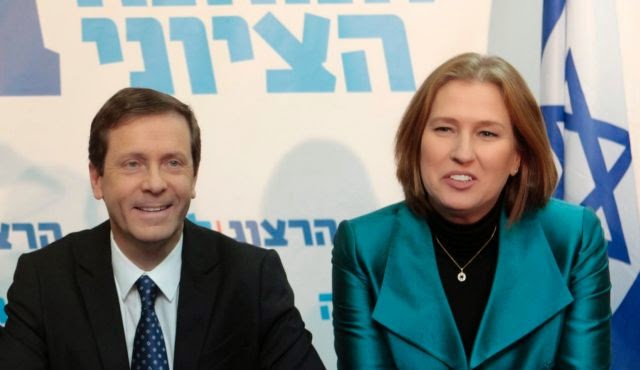




















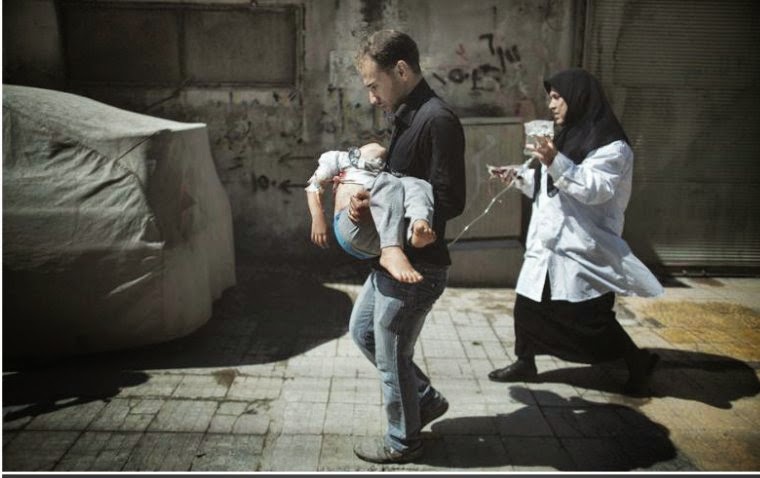



















.jpeg)








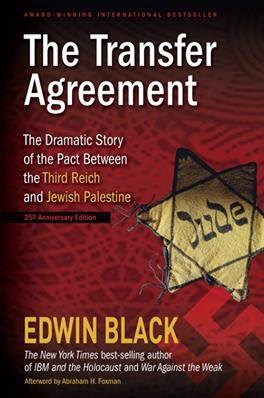









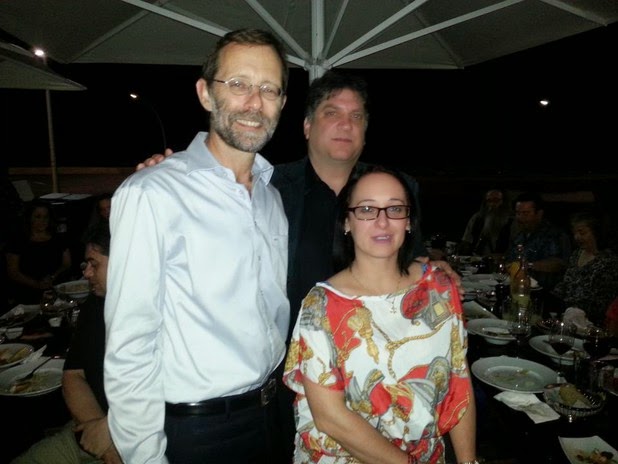
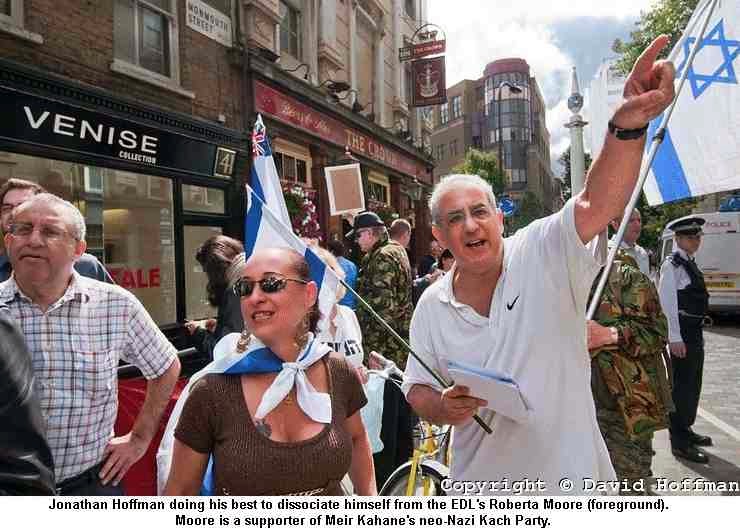
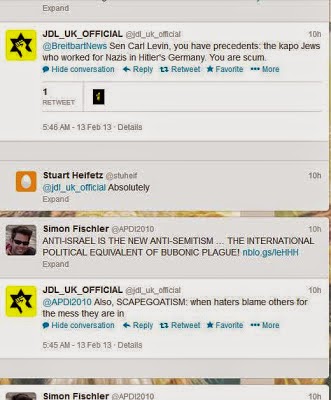


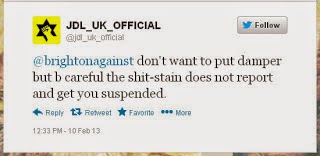
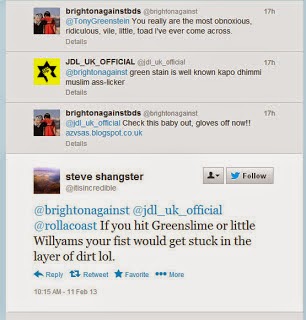


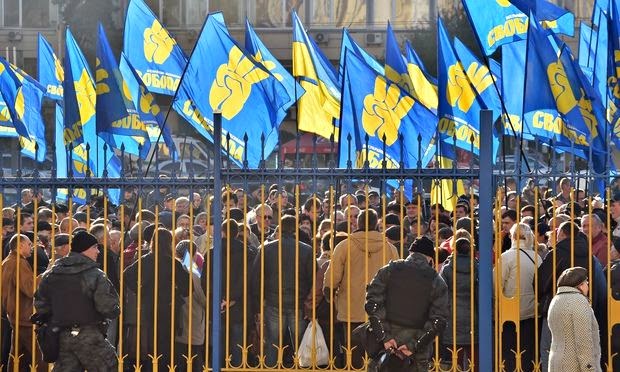
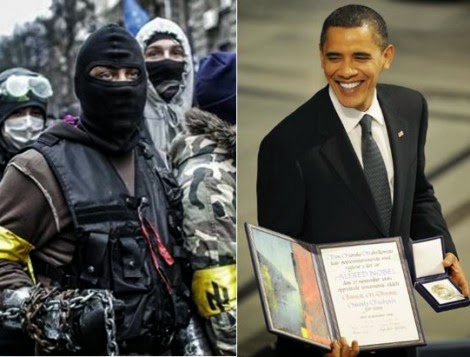
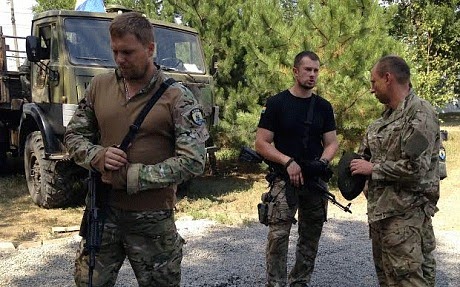

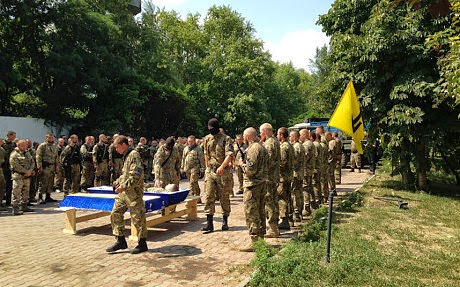





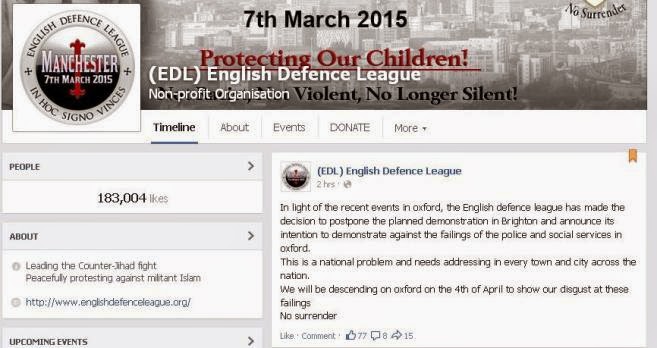
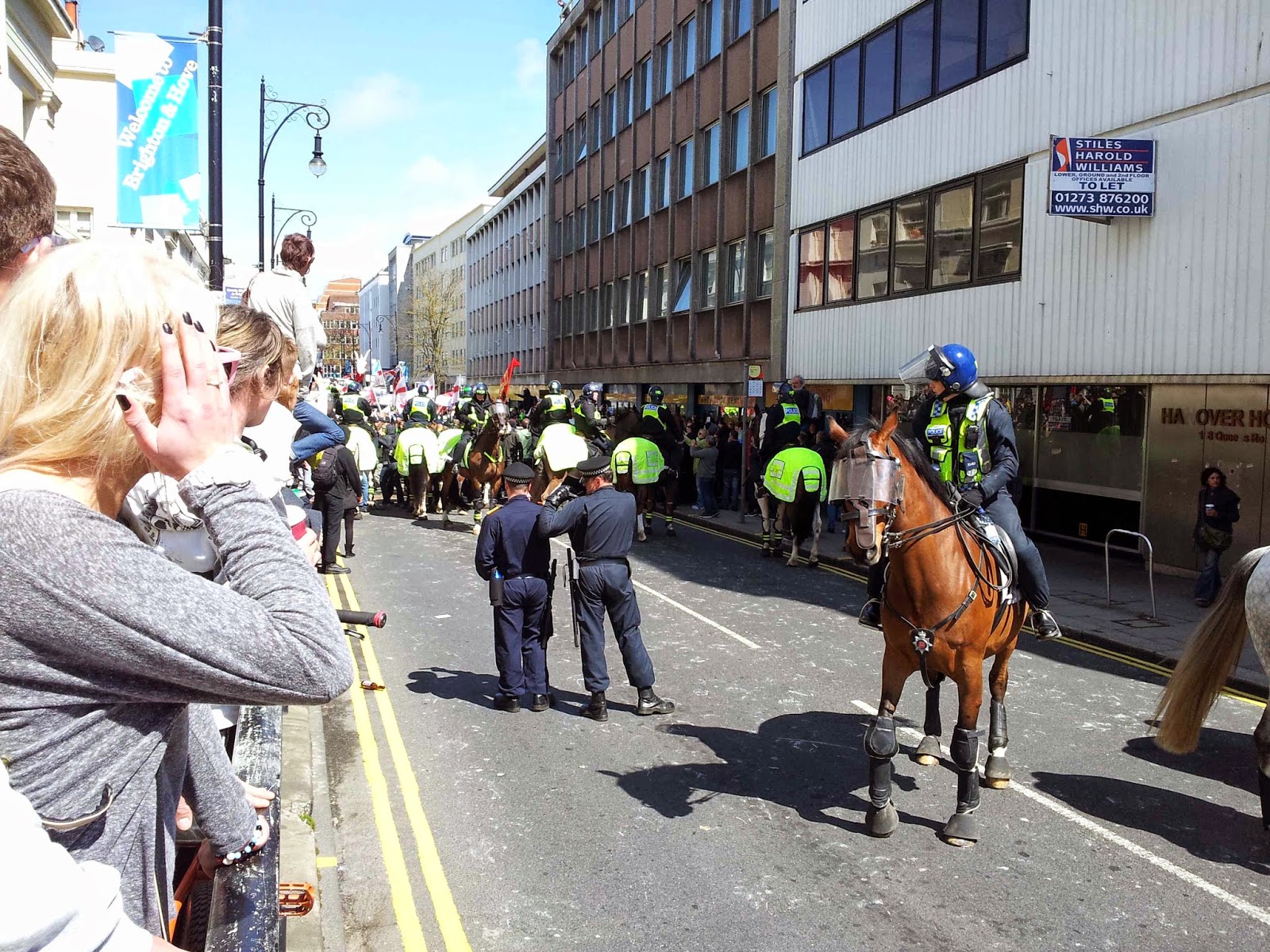.jpg)
.jpg)


.jpg)































